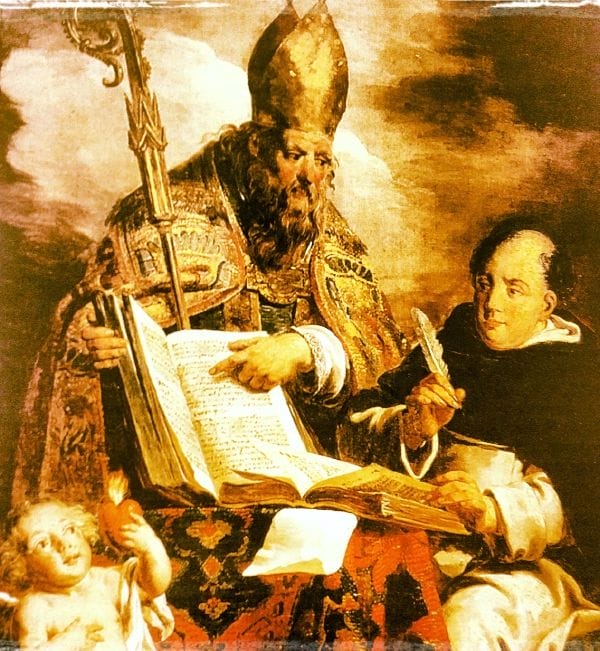Every January 28 we remember St. Thomas Aquinas, one of the greatest theologians of the Church. Among his many references, there was also St. Augustine. We asked the Augustinologist Fr. Enrique Eguiarte about the influence of the Bishop of Hippo on the thought and work of the Angelic Doctor.
The Summa Theologiae of St. Thomas Aquinas represents a true masterpiece of scholastic theology that marked a milestone in theological studies, and that continues to be highly topical. Within it we can find hundreds of times the expression that heads this text, Augustinus dixit, since St. Thomas continually turns his eyes to the authority of St. Augustine to base his lucubrations, and to build his own theological reflection on a firm and secure foundation.
Throughout the Summa Theologiae we can see how St. Thomas has carefully read and studied the work of St. Augustine, both the canonical works and the works that in his time circulated under the name of St. Augustine, and to which Aquinas himself had access, as is the case of the Ambrosiaster and St. Fulgentius of Ruspe (whom he specifically cites in C.31 a. 2, believing that he is referring to St. Augustine).
Among Augustinian works, possibly the most cited book is the De Trinitate. For example, in C. 1 a. 2, he justifies the study of sacred science and its objectives. For this reason he refers to De Trinitate XIV, 7, and quotes these words of St. Augustine: “To this science (sc. theology) belongs only that which fertilizes, nourishes, defends and strengthens the faith that saves”.
Further on, in order to point out that the man who has God himself as the cause and foundation of his life can be called wise, he quotes again the De Trinitate of St. Augustine saying: “hence wisdom is defined as the science of the divine, as Augustine refers to it in the XII book De Trinitate“.
But the figure of St. Augustine not only serves him as a basis for his strictly theological thought. St. Thomas shows us that he had read the most important works of St. Augustine, or at least had studied well the Florilegios of his time, for in speaking of the authority of Sacred Scripture and the importance of the canonical books – as St. Augustine himself had already pointed out in his work De Doctrina Christiana –he emphasizes the fact that faith is based on the teachings found in the Sacred Scriptures, in which it is necessary to distinguish the canonical books from the apocryphal books. And so St. Thomas points out: “Therefore Augustine says(dixit Augustinus) in his letter to Jerome: ‘Only in the books of Scripture called canonical I have deposited the honor of accepting and believing without reservation that their author was not mistaken in writing them. The other books, however great the sanctity and doctrine I may find in them, I do not therefore accept them without further ado, even though their authors lived and wrote as saints and sages’(ep. 82:3).”
But despite the ubiquity of Augustine’s De Trnitate within Aquinas’ work, other classical works are not absent, such as the Confessions, which St. Thomas uses to exemplify that the philosophers – such as Aristotle himself, whom he specifically cites in the text – arrived at the idea of a God, but not the Christian God, because although he has many similar elements, he is not an incarnate God, emphasizing the importance of mercy and the closeness of the Christian God (c. 32 a. 1). 32 a. 1). Thus St. Thomas says: “Augustine also says in Confessions VII: ‘(In the books of the Platonists) I read not with the same words, but it is completely the same, with many and varied persuasive arguments, that in the beginning was the Word and that the Word was next to God and that the Word was God’.
St. Thomas Aquinas has left us a true monument of Christian thought in his Summa Theologiae. His work is a continuous dialogue with the Scriptures, with the theological tradition and with the Fathers of the Church, particularly with St. Augustine. For this reason, one could perfectly well put into the mouth of St. Thomas Aquinas the words of Calvin: Augustinus totus noster est!
Fr. Enrique Eguiarte, OAR


